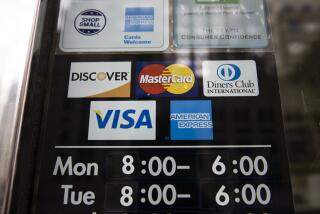Americans scale back on big loans
- Share via
WASHINGTON — U.S. loans for big-ticket items like cars fell in October for a second consecutive month, according to a Federal Reserve report Friday that suggested tighter lending conditions in the wake of a global credit crunch.
It was the first back-to-back decline for this type of loan since 1992.
Nonrevolving credit, which includes closed-end loans for big-ticket items such as cars, boats, college educations and holidays, declined by $1.64 billion, or 1.26%, to $1.561 trillion, the Fed said.
In addition, September’s report of nonrevolving credit was revised to show a decline of $1.37 billion from a previously estimated $363-million increase.
The data can be seen in different ways. One explanation might be that tougher lending standards mean fewer customers qualify for this type of borrowing, which is dominated by auto loans.
Financial firms have suffered heavy losses as a result of a credit crunch spurred by problems in the U.S. sub-prime mortgage market. As a result, many are being more careful in their lending. Or the declines might be driven by weaker demand for credit as consumers tighten their belts.
Overall U.S. consumer borrowing rose by $4.71 billion in October, compared with forecasts of a $5-billion rise. The increase was at an annual rate of 2.27% and took the total to $2.490 trillion, the Fed said.
This followed a downward revision to September’s credit numbers, which were trimmed to a gain of $3.21 billion from an originally reported $3.75-billion rise. August’s increase was revised upward to $20.75 billion.
Revolving credit, made up of credit and charge cards, rose $6.34 billion, or an 8.3% rate, to $928.49 billion in October. This compares to an upwardly revised September increase of $4.59 billion.
More to Read
Inside the business of entertainment
The Wide Shot brings you news, analysis and insights on everything from streaming wars to production — and what it all means for the future.
You may occasionally receive promotional content from the Los Angeles Times.










